- Home
- Charles de Lint
Spiritwalk Page 2
Spiritwalk Read online
Page 2
“I don’t know,” she said. “I was just looking out at the garden and I suddenly found myself remembering. I wonder what ever happened to him... ?”
“Jamie gave me some books about a man with the same name as you,” she told the red-haired boy the next time she saw him. “And after I read them, I went into the Library and found some more. He was quite famous, you know.”
“So I’m told,” the boy said with a smile.
“But it’s all so confusing,” Sara went on. “There’s all these different stories, supposedly about the same man.... How are you supposed to know which of them is true?”
“That’s what happens when legend and myth meet,” the boy said. “Everything gets tangled.”
“Was there even a real Merlin, do you think? I mean, besides you.”
“A great magician who was eventually trapped in a tree?”
Sara nodded.
“I don’t think so,” the boy said.
“Oh.”
Sara didn’t even try to hide her disappointment.
“But that’s not to say there was never a man named Merlin,” the boy added. “He might have been a bard, or a follower of old wisdoms. His enchantments might have been more subtle than the great acts of wizardry ascribed to him in the stories.”
“And did he end up in a tree?” Sara asked eagerly. “That would make him like you. I’ve also read that he got trapped in a cave, but I think a tree’s much more interesting, don’t you?”
Because her Merlin lived in a tree.
“Perhaps it was in the idea of a tree,” the boy said.
Sara blinked in confusion. “What do you mean?”
“The stories seem to be saying that one shouldn’t teach, or else the student becomes too knowledgeable and then turns on the teacher. I don’t believe that. It’s not the passing on of knowledge that would root someone like Merlin.”
“Well, then what would?”
“Getting too tangled up in his own quest for understanding. Delving so deeply into the calendaring trees that he lost track of where he left his body until one day he looked around to find that he’d become what he was studying.”
“I don’t understand.”
The red-haired boy smiled. “I know. But I can’t speak any more clearly.”
“Why not?” Sara asked, her mind still bubbling with the tales of quests and wizards and knights that she’d been reading. “Were you enchanted? Are you trapped in that oak tree?”
She was full of curiosity and determined to find out all she could, but in that practiced way that the boy had, he artfully turned the conversation onto a different track and she never did get an answer to her questions.
It rained that night, but the next night the skies were clear. The moon hung above the Mondream Wood like a fat ball of golden honey; the stars were so bright and close Sara felt she could just reach up and pluck one as though it were an apple, hanging in a tree. She had crept from her bedroom in the northwest tower and gone out into the garden, stepping secretly as a thought through the long darkened corridors of the House until she was finally outside.
She was looking for magic.
Dreams were one thing. She knew the difference between what you found in a dream and when you were awake; between a fey red-haired boy who lived in a tree and real boys; between the dreamlike enchantments of the books she’d been reading—enchantments that lay thick as acorns under an oak tree—and the real world where magic was a card trick, or a stage magician pulling a rabbit out of a hat on The Ed Sullivan Show.
But the books also said that magic came awake in the night. It crept from its secret hidden places—called out by starlight and the moon—and lived until the dawn pinked the eastern skies. She always dreamed of the red-haired boy when she slept under his oak in the middle of the garden. But what if he was more than a dream? What if at night he stepped out of his tree—really and truly, flesh and blood and bone real?
There was only one way to find out.
Sara felt restless after Julie went home. She put away her guitar and then distractedly set about straightening up her room. But for every minute she spent on the task, she spent three just looking out the window at the garden.
I never dream, she thought.
Which couldn’t be true. Everything she’d read about sleep research and dreaming said that she had to dream. People just needed to. Dreams were supposed to be the way your subconscious cleared up the day’s clutter. So, ipso facto, everybody dreamed. She just didn’t remember hers.
But I did when I was a kid, she thought. Why did I stop? How could I have forgotten the red-haired boy in the tree?
Merlin.
Dusk fell outside her window to find her sitting on the floor, arms folded on the windowsill, chin resting on her arms as she looked out over the garden. As the twilight deepened, she finally stirred. She gave up the pretense of cleaning up her room. Putting on a jacket, she went downstairs and out into the garden.
Into the Mondream Wood.
Eschewing the paths that patterned the garden, she walked across the dew-wet grass, fingering the damp leaves of the bushes and the low-hanging branches of the trees. The dew made her remember Gregor Penev—an old Bulgarian artist who’d been staying in the House when she was a lot younger. He’d been full of odd little stories and explanations for natural occurrences—much like Jamie was, which was probably why Gregor and her uncle had gotten along so well.
“Zaplakala e gorata, “ he’d replied when she’d asked him where dew came from and what it was for. “The forest is crying. It remembers the old heroes who lived under its branches—the heroes and the magicians, all lost and gone now. Robin Hood. Indje Voivode. Myrddin.”
Myrddin. That was another name for Merlin. She remembered reading somewhere that Robin Hood was actually a Christianized Merlin, the Anglo version of his name being a variant of his Saxon name of Rof Breocht Woden—the Bright Strength of Wodan. But if you went back far enough, all the names and stories got tangled up in one story. The tales of the historical Robin Hood, like those of the historical Merlin of the Borders, had acquired older mythic elements common to the world as a whole by the time they were written down. The story that their legends were really telling was that of the seasonal hero-king, the May Bride’s consort, who with his cloak of leaves and his horns, and all his varying forms, was the secret truth that lay in the heart of every forest.
“But those are European heroes,” she remembered telling Gregor. “Why would the trees in our forest be crying for them?”
“All forests are one,” Gregor had told her, his features serious for a change. “They are all echoes of the first forest that gave birth to Mystery when the world began.”
She hadn’t really understood him then, but she was starting to understand him now as she made her way to the fountain at the center of the garden, where the old oak tree stood guarding its secrets in the heart of the Mondream Wood. There were two forests for every one you entered. There was the one you walked in, the physical echo, and then there was the one that was connected to all the other forests, with no consideration of distance, or time.
The forest primeval, remembered through the collective memory of every tree in the same way that people remembered myth—through the collective subconscious that Jung mapped, the shared mythic resonance that lay buried in every human mind. Legend and myth, all tangled in an alphabet of trees, remembered, not always with understanding, but with wonder. With awe.
Which was why the druids’ Ogham was also a calendar of trees.
Why Merlin was often considered to be a druid.
Why Robin was the name taken by the leaders of witch covens.
Why the Green Man had antlers—because a stag’s tines are like the branches of a tree.
Why so many of the early avatars were hung from a tree. Osiris. Balder. Dionysus. Christ.
Sara stood in the heart of the Mondream Wood and looked up at the old oak tree. The moon lay behind its branches, mysteriously close. The a
ir was filled with an electric charge, as though a storm were approaching, but there wasn’t a cloud in the sky.
“Now I remember what happened that night,” Sara said softly.
Sara grew to be a small woman, but at nine years old she was just a tiny waif—no bigger than a minute, as Jamie liked to say. With her diminutive size she could slip soundlessly through thickets that would allow no easy egress for an adult. And that was how she went.
She was a curly-haired gamine, ghosting through the hawthorn hedge that bordered the main path. Whispering across the small glade guarded by the statue of a little horned man that Jamie said was Favonius, but she privately thought of as Peter Pan, though he bore no resemblance to the pictures in her Barrie book. Tiptoeing through the wildflower garden, a regular gallimaufry of flowering plants, both common and exotic. And then she was near the fountain. She could see Merlin’s oak, looming up above the rest of the garden like the lordly tree it was.
And she could hear voices.
She crept nearer, a small shadow hidden in deeper patches cast by the fat yellow moon.
“—never a matter of choice,” a man’s voice was saying. “The lines of our lives are laid out straight as a dodman’s leys, from event to event. You chose your road.”
She couldn’t see the speaker, but the timbre of his voice was deep and resonating, like a deep bell. She couldn’t recognize it, but she did recognize Merlin’s when he replied to the stranger.
“When I chose my road, there was no road. There was only the trackless wood; the hills, lying crest to crest like low-backed waves; the glens where the harps were first imagined and later strung. Ca’canny, she told me when I came into the Wood. I thought go gentle meant go easy, not go fey; that the oak guarded the Borders, marked its boundaries. I never guessed it was a door.”
“All knowledge is a door,” the stranger replied. “You knew that.”
“In theory,” Merlin replied.
“You meddled.”
“I was born to meddle. That was the part I had to play.”
“But when your part was done,” the stranger said, “you continued to meddle.”
“It’s in my nature, Father. Why else was I chosen?”
There was a long silence then. Sara had an itch on her nose but she didn’t dare move a hand to scratch it. She mulled over what she’d overheard, trying to understand.
It was all so confusing. From what they were saying it seemed that her Merlin was the Merlin in the stories. But if that was true, then why did he look like a boy her own age? How could he even still be alive? Living in a tree in Jamie’s garden and talking to his father...
“I’m tired,” Merlin said. “And this is an old argument, Father. The winters are too short. I barely step into a dream and then it’s spring again. I need a longer rest. I’ve earned a longer rest. The Summer Stars call to me.”
“Love bound you,” the stranger said.
“An oak bound me. I never knew she was a tree.”
“You knew. But you preferred to ignore what you knew because you had to riddle it all. The salmon wisdom of the hazel wasn’t enough. You had to partake of the fruit of every tree.”
“I’ve learned from my error,” Merlin said. “Now set me free, Father.”
“I can’t. Only love can unbind you.”
“I can’t be found, I can’t be seen,” Merlin said. “What they remember of me is so tangled up in Romance, that no one can find the man behind the tales. Who is there to love me?”
Sara pushed her way out of the thicket where she’d been hiding and stepped into the moonlight.
“There’s me,” she began, but then her voice died in her throat.
There was no red-haired boy standing by the tree. Instead, she found an old man with the red-haired boy’s eyes. And a stag. The stag turned its antlered head toward her and regarded her with a gaze that sent shivers scurrying up and down her spine. For a long moment its gaze held hers; then it turned, its flank flashing red in the moonlight, and the darkness swallowed it.
Sara shivered. She wrapped her arms around herself, but she couldn’t escape the chill.
The stag...
That was impossible. The garden had always been strange, seeming so much larger than its acreage would allow, but there couldn’t possibly be a deer living in it without her having seen it before. Except... What about a boy becoming an old man overnight? A boy who really and truly did live in a tree?
“Sara,” the old man said.
It was Merlin’s voice. Merlin’s eyes. Her Merlin grown into an old man.
“You... you’re old,” she said.
“Older than you could imagine.”
“But—”
“I came to you as you’d be most likely to welcome me.”
“Oh.”
“Did you mean what you said?” he asked.
Memories flooded Sara. She remembered a hundred afternoons of warm companionship. All those hours of quiet conversation and games. The peace that came from her night fears. If she said yes, then he’d go away. She’d lose her friend. And the night fears... Who’d be there to make the terrors go away? Only he had been able to help her. Not Jamie nor anyone else who lived in the House, though they’d all tried.
“You’ll go away... won’t you?” she said.
He nodded. An old man’s nod. But the eyes were still young. Young and old, wise and silly, all at the same time. Her red-haired boy’s eyes.
“I’ll go away,” he replied. “And you won’t remember me.”
“I won’t forget,” Sara said. “I would never forget.”
“You won’t have a choice,” Merlin said. “Your memories of me would come with me when I go.”
“They’d be... gone forever... ?”
That was worse than losing a friend. That was like the friend never having been there in the first place.
“Forever,” Merlin said. “Unless...”
His voice trailed off, his gaze turned inward.
“Unless what?” Sara asked finally.
“I could try to send them back to you when I reach the other side of the river.”
Sara blinked with confusion. “What do you mean? The other side of what river?”
“The Region of the Summer Stars lies across the water that marks the boundary between what is and what has been. It’s a long journey to that place. Sometimes it takes many lifetimes.”
They were both quiet then. Sara studied the man that her friend had become. The gaze he returned her was mild. There were no demands in it. There was only regret. The sorrow of parting. A fondness that asked for nothing in return.
Sara stepped closer to him, hesitated a moment longer, then hugged him.
“I do love you, Merlin,” she said. “I can’t say I don’t when I do.”
She felt his arms around her, the dry touch of his lips on her brow.
“Go gentle,” he said. “But beware the calendaring of the trees.”
And then he was gone.
One moment they were embracing and the next her arms only held air. She let them fall limply to her sides. The weight of an awful sorrow bowed her head. Her throat grew thick, her chest tight. She swayed where she stood, tears streaming from her eyes.
The pain felt like it would never go away.
But the next thing she knew she was waking in her bed in the northwest tower and it was the following morning. She woke from a dreamless sleep, clear-eyed and smiling. She didn’t know it, but her memories of Merlin were gone.
But so were her night fears.
The older Sara, still not a woman, but old enough to understand more of the story now, fingered a damp leaf and looked up into the spreading canopy of the oak above her.
Could any of that really have happened? she wondered. The electric charge she’d felt in the air when she’d approached the old oak was gone. That pregnant sense of something about to happen had faded. She was left with the moon, hanging lower now, the stars still bright, the garden quiet. It was all magica
l, to be sure, but natural magic—not supernatural.
She sighed and kicked at the autumn debris that lay thick about the base of the old tree. Browned leaves, broad and brittle. And acorns. Hundreds of acorns. Fred the gardener would be collecting them soon for his compost—at least those that the black squirrels didn’t hoard away against the winter. She went down on one knee and picked up a handful of them, letting them spill out of her hand.
Something different about one of them caught her eye as it fell, and she plucked it up from the ground. It was a small brown ovoid shape, an incongruity in the crowded midst of all the capped acorns. She held it up to her eye. Even in the moonlight she could see what it was.
A hazelnut.
Salmon wisdom locked in a seed.
Had she regained memories, memories returned to her now from a place where the Summer Stars always shone, or had she just had a dream in the Mondream Wood where as a child she’d thought that the trees dreamed they were people?
Smiling, she pocketed the nut, then slowly made her way back into the House.
ASCIAN IN ROSE
ASCIAN—one who casts no shadow
I saw old Autumn in the misty morn
Stand shadowless like silence,
listening
To silence.
—Thomas Hood, from “Autumn”
One
She was running along a downhill stretch of the Gatineau Parkway, an asphalt ribbon that cut through the wooded Gatineau Hills. The grass on the verge swallowed the sound of her footsteps, but not the ragged rasp of her breathing. Panic shrieked through every nerve end. The moon was fat and swollen above her, but she cast no shadow.
Her mind was empty, except for her fear. She couldn’t remember her name. She didn’t know where she was. She didn’t know who was chasing her. All she knew was that they were closing in.
Terror drummed in her chest—a monster that consumed her with a will of its own. It wailed through her nervous system, a banshee howl that gained intensity with every pace that closed the gap between herself and what she fled.
And then she stumbled.
She fell with bruising force against the ground. Flailing her arms, she landed in a sprawl. One hand clawed at the grass, trying to stop the force of her momentum. The other was closed in a fist so tight that her knuckles were white.

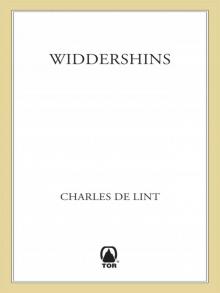 Widdershins
Widdershins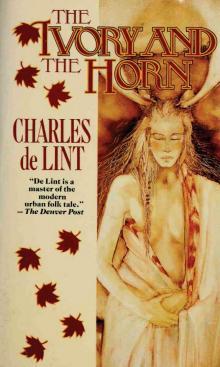 The Ivory and the Horn
The Ivory and the Horn Yarrow
Yarrow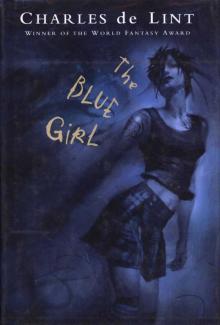 The Blue Girl
The Blue Girl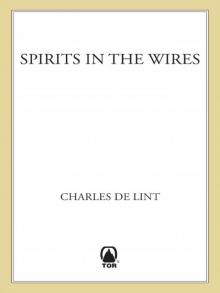 Spirits in the Wires
Spirits in the Wires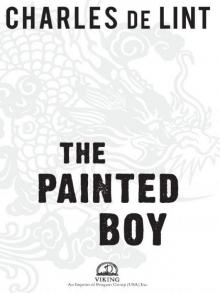 The Painted Boy
The Painted Boy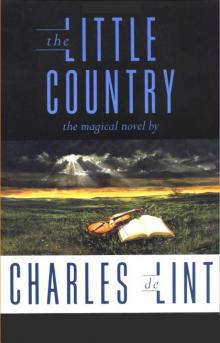 The Little Country
The Little Country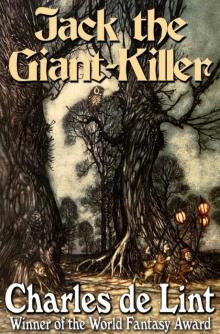 Jack of Kinrowan: Jack the Giant-Killer / Drink Down the Moon
Jack of Kinrowan: Jack the Giant-Killer / Drink Down the Moon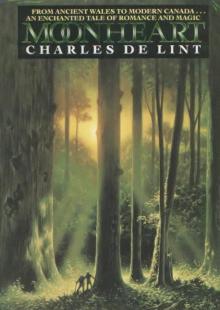 Moonheart
Moonheart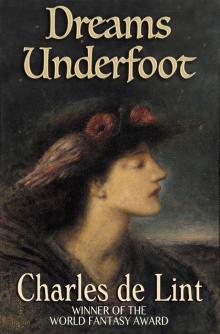 Dreams Underfoot
Dreams Underfoot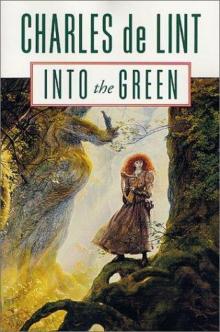 Into the Green
Into the Green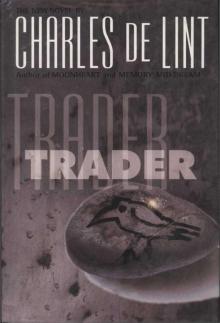 Trader
Trader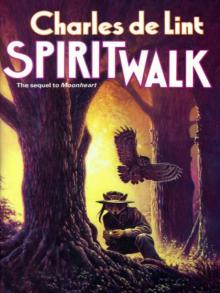 Spiritwalk
Spiritwalk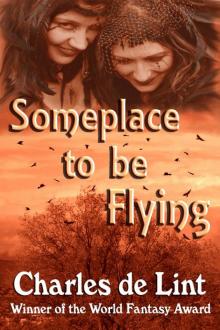 Someplace to Be Flying
Someplace to Be Flying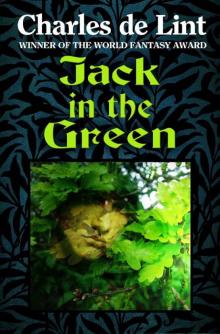 Jack in the Green
Jack in the Green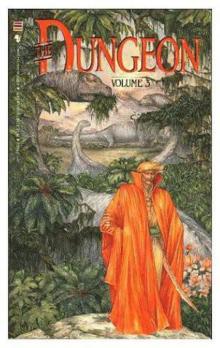 The Valley of Thunder
The Valley of Thunder Out of This World
Out of This World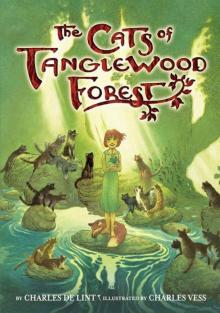 The Cats of Tanglewood Forest
The Cats of Tanglewood Forest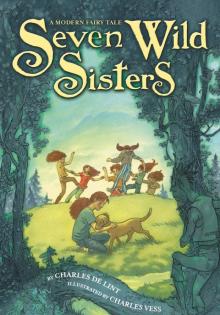 Seven Wild Sisters
Seven Wild Sisters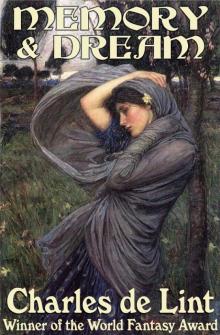 Memory and Dream
Memory and Dream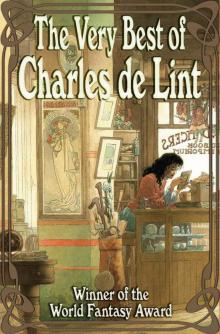 The Very Best of Charles De Lint
The Very Best of Charles De Lint Under My Skin
Under My Skin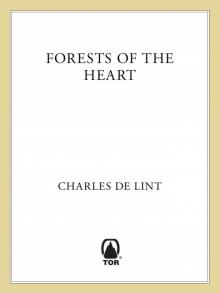 Forests of the Heart
Forests of the Heart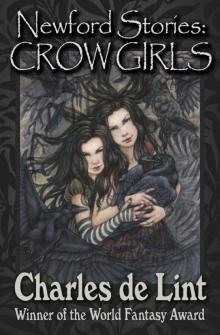 The Newford Stories
The Newford Stories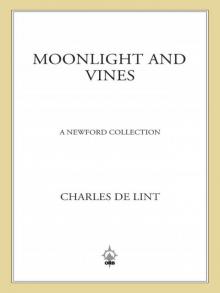 Moonlight and Vines
Moonlight and Vines Angel of Darkness
Angel of Darkness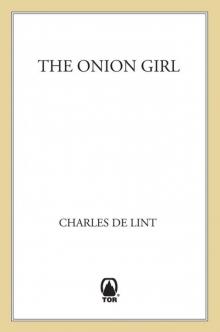 The Onion Girl
The Onion Girl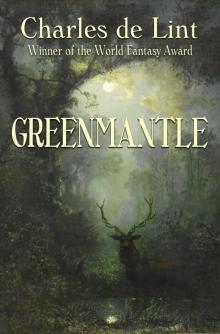 Greenmantle
Greenmantle Waifs And Strays
Waifs And Strays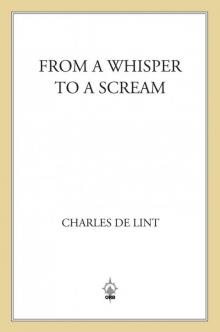 From a Whisper to a Scream
From a Whisper to a Scream Over My Head
Over My Head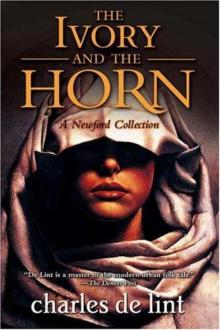 The Ivory and the Horn n-6
The Ivory and the Horn n-6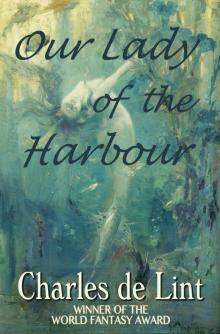 Our Lady of the Harbour
Our Lady of the Harbour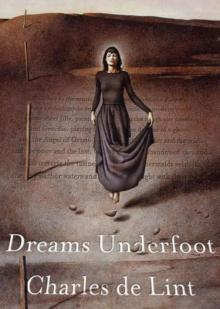 Dreams Underfoot n-1
Dreams Underfoot n-1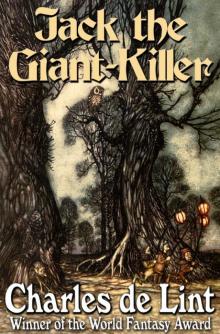 Jack the Giant-Killer (Jack of Kinrowan Book 1)
Jack the Giant-Killer (Jack of Kinrowan Book 1)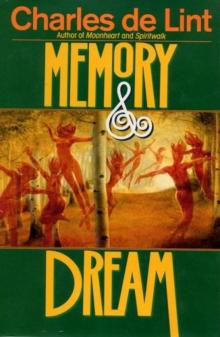 Memory and Dream n-5
Memory and Dream n-5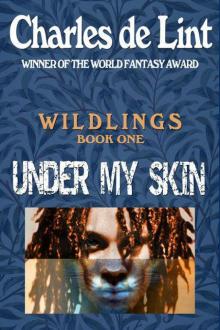 Under My Skin (Wildlings)
Under My Skin (Wildlings)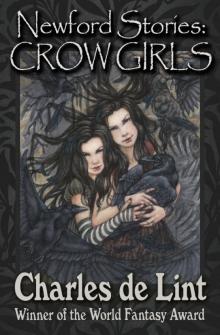 Newford Stories
Newford Stories The Wind in His Heart
The Wind in His Heart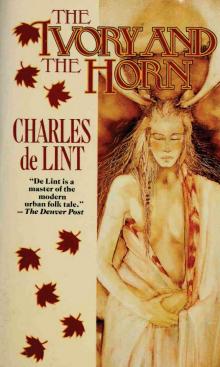 Ivory and the Horn
Ivory and the Horn